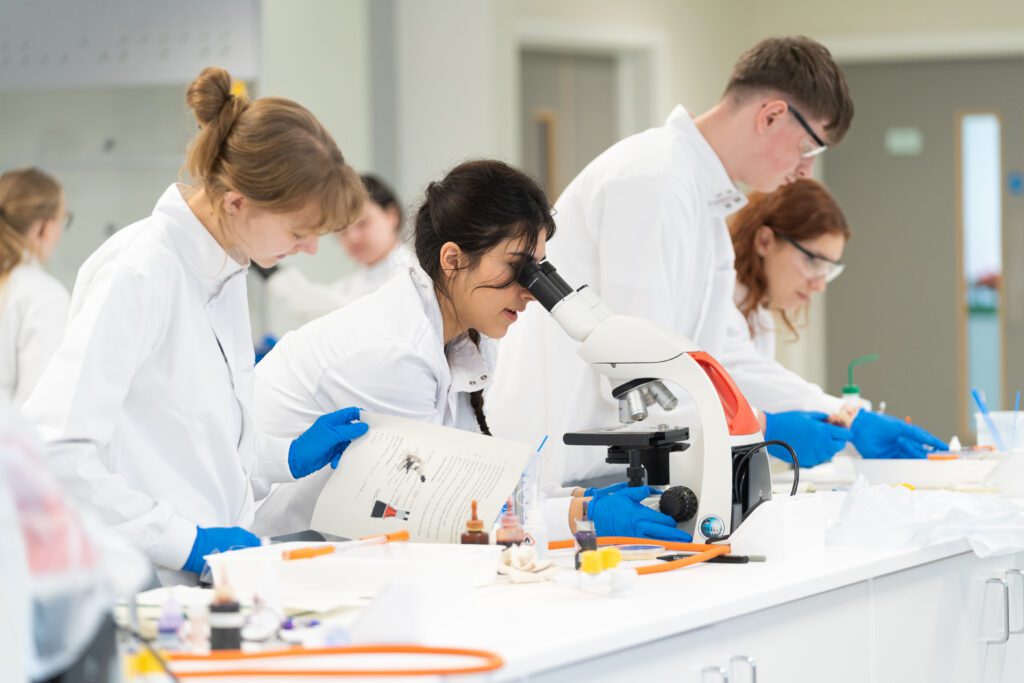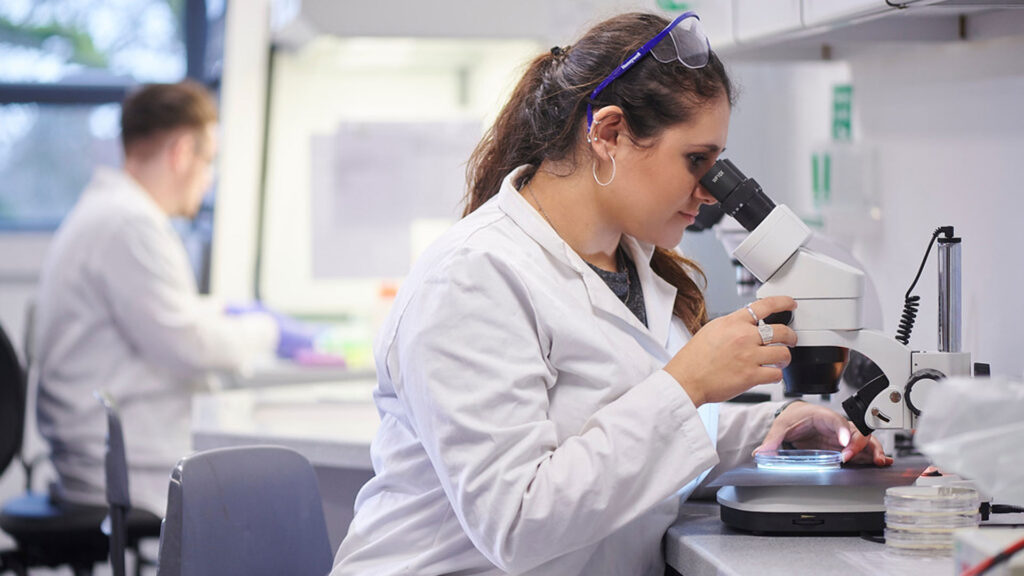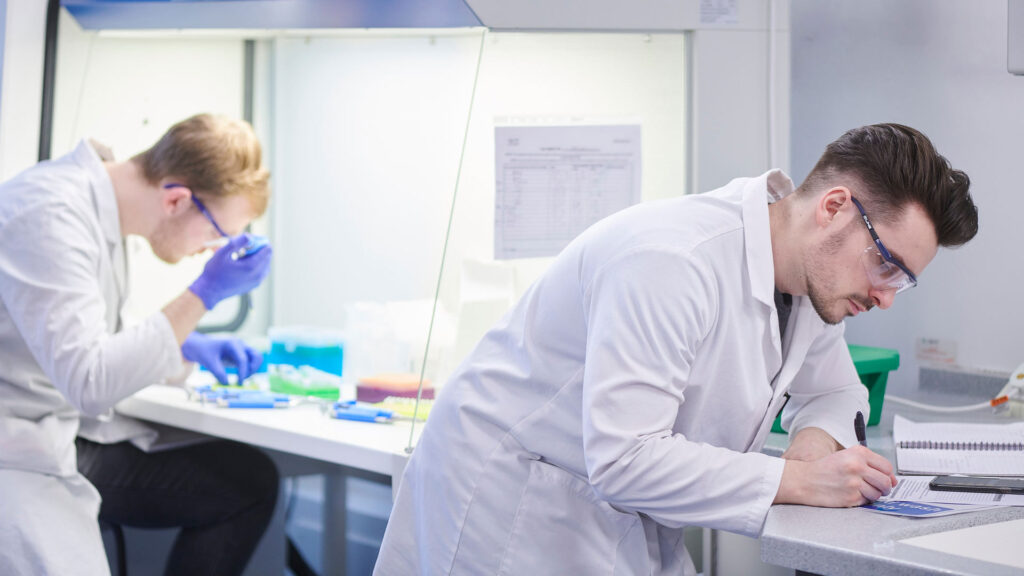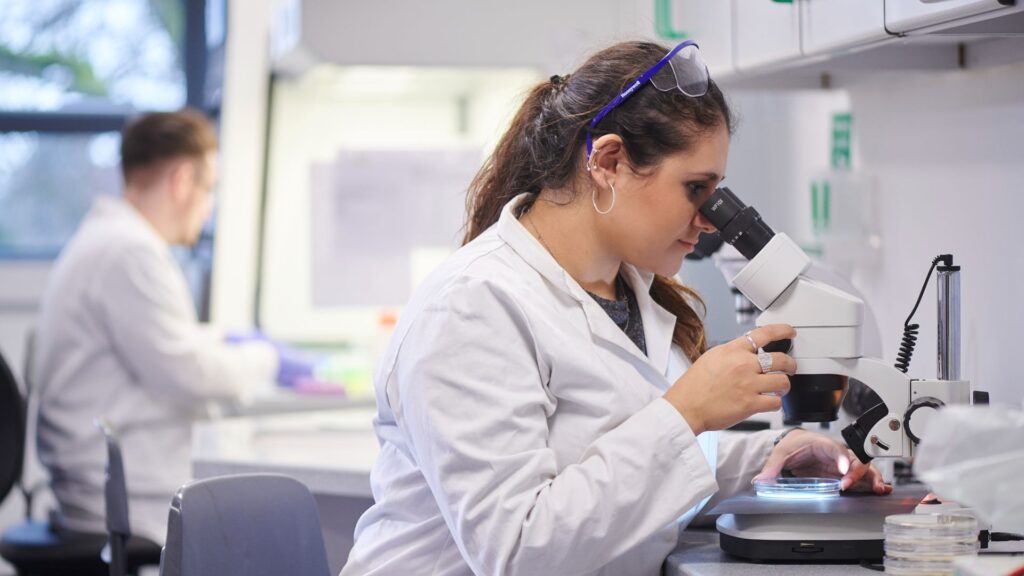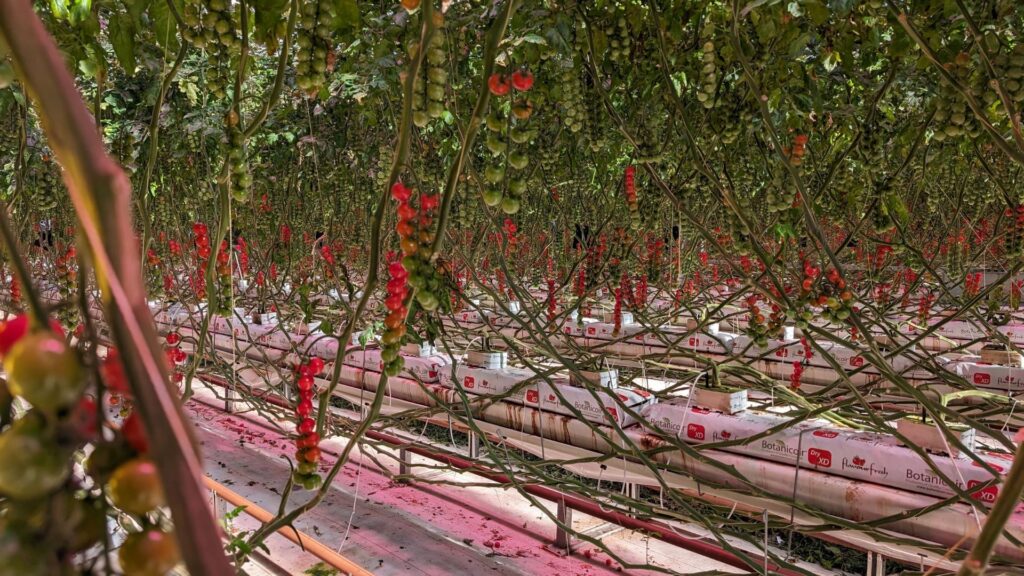Global Infectious Disease MSci (Hons)
UCAS code: B909
Prevent. Control. Cure. Arm yourself with specialist knowledge and skills and head to the forefront of the global fight against infectious diseases on the only MSci degree to be delivered in partnership with the Liverpool School of Tropical Medicine, a world-leader in infectious disease research.
Subject to validation.
Overview
| Course length: | 4 years full-time |
|---|---|
| Start dates: | September 2026 |
| Location: | Edge Hill University and Liverpool School of Tropical Medicine, Pembroke Place |
| Example offers: | 112-120 UCAS Tariff points, including A level Biology (Grade B or above). View full entry criteria |
| Subject(s): | Biology and Biosciences |
| Faculty: | Arts and Sciences |
| Department: | Biology |
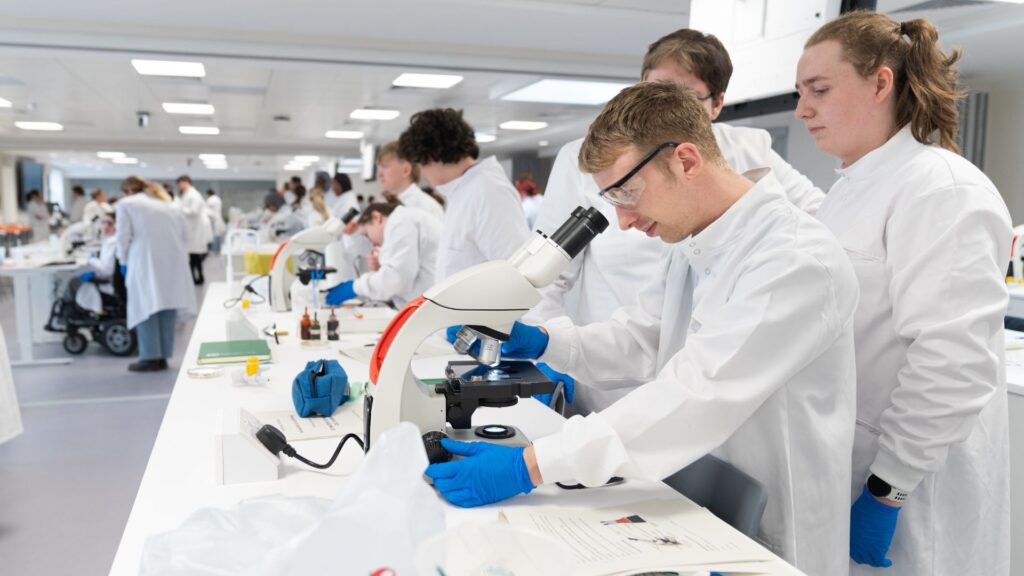
Are you committed to creating a better future for communities across the globe? Do you want to develop knowledge and skills that could have a positive and lasting impact on human health and well-being? Our four year integrated Masters degree allows you to investigate some of the world’s greatest health challenges, alongside influential researchers in world-class laboratories.
Develop a critical understanding of infectious disease biology, whilst appreciating the associated inequalities that contribute to disease control efforts. Build practical knowledge and specialist skills in state-of-the-art facilities. Tailor your degree to your specific interests and career aspirations, by combining core learning with optional modules.
With more than a century at the forefront of global disease control efforts, the Liverpool School of Tropical Medicine partnership also allows you to make use of a global commercial and academic network. Join an international association of academic and industry partners, working in collaboration to solve infectious disease issues linked to diseases such as COVID-19, TB, malaria, dengue.
By the end of this degree, you will be well-equipped to apply your evolving expertise to a multitude of careers including drug and vaccine development, vector control and health programme management.
Course features
-
International students can apply
-
Sandwich year option available
-
Studying abroad option available
-
Professional practice placements
-
Fieldwork
What you'll study
Year 1 of MSci Global Infectious Disease is designed to introduce you to cell biology, genetics and the basic skills required of a biological scientist. You will also have the opportunity to select modules to suit your interests and career aspirations. From modules in biodiversity and ecology to those centred around human anatomy and chemistry, we will equip you with the foundations needed to prepare you for a range of careers including drug development, investigating the impact of disease on human body systems or working on natural reservoirs of disease.
Compulsory Modules
- Biology in Practice
- Genetics and Evolution
- Introduction to Cell Biology
Optional Modules
Three of:
- Anatomy and Physiology
- Ecology
- Chemistry for Biologists
- Biodiversity
- Organic Chemistry
- Language 1
In Year 2, you will learn how immune systems react and combat disease infections, before gaining more in-depth knowledge of the viruses, bacteria and parasites which cause them. You will continue your training in practical skills relevant to a future career in infectious disease biology and conduct a short research project at the laboratory facilities of Liverpool School of Tropical Medicine, supervised by LSTM researchers. Whether you’re are interested in working with animal-or insect-reservoirs of disease-causing organisms or pursuing a laboratory-based career in drug or vaccine development, optional modules will provide you with opportunities to pursue more advanced knowledge and skills in areas that meet their specific interests and aspirations.
Compulsory Modules
- Research Skills in Infectious Disease Biology
- Virology and Parasitology
- Immunology and Infectious Diseases
Optional Modules
Two of:
- Research Methods in Biology
- Applied Skills in Global Infectious Disease
- Pathogens and Vectors
- Techniques in Biochemistry
- Molecular Genetics
- Biochemistry and Metabolism
- Introduction to Biotechnology
- Invertebrate Ecology
- Zoo Conservation and Animal Behaviour
In Year 3, you will propose, plan and execute an individual research project on the theme of infectious disease. This research project will be carried out at Liverpool School of Tropical Medicine laboratories and supervised by LSTM researchers. You will also study advanced topics including how to manage a public health issue related to infectious disease. Module options will provide further tuition on molecular, cellular and whole-organism biology to further deepen your knowledge and skills on advanced topics beyond infectious disease biology.
Compulsory Modules
- Advanced Skills in Infectious Disease Research
- Global Health and Infectious Disease
Optional Modules
Three of:
- Genomics and Bioinformatics
- Pathology
- Pharmacology
- Advanced Tissue Applications
- Applications of Biotechnology
- Medical Microbiology
- Epidemiology
In Year 4, you will learn about advanced topics in the biology of pathogens and disease vectors, as well as complete a research and professional skills module in semester 1. In semester 2, you will plan and carry out a research project while embedded within a research group at the Liverpool School of Tropical Medicine. You will also choose a taught specialist module with topics ranging from parasitology, bioinformatics and snakebites, to the effects of climate change on global health. You will be expected to organise your research project commitments with your learning commitments.
Compulsory Modules
Advanced Pathogen and Vector Biology
Infectious Disease
Professional Skills
Research Project
Optional Modules
TBC
How you'll study
You will be taught via a combination of lectures, practical work and tutorials. For the first 3 years of study, you will be at the Edge Hill University main campus in Ormskirk and the Liverpool School of Tropical Medicine facilities in Liverpool. In the 4th year of study, you will be based at the Liverpool School of Tropical Medicine, but will have access to Edge Hill University facilities and resources.
A typical week of study during term time will involve 12 – 16 hours of face-to-face learning sessions. You will be expected to use the combined study facilities and resources of EHU and LSTM to further develop your skills and knowledge through independent study.
How you'll be assessed
You will be assessed using a combination of coursework and exams to ensure you develop a range of skills required by future employers. You will complete independent coursework tasks including practical write-ups, essays and research log books as well as addressing a real-world public heath issue, as part of a team.
Who will be teaching you
Edge Hill University and Liverpool School of Tropical Medicine have a long history in delivering excellent teaching in higher education. You will be taught by academic staff members affiliated to EHU and LSTM who are all experts in their respective fields of biology. In-depth topics in infectious disease biology, and the research elements of the programme, will be taught and supervised by researchers who are highly experienced in the field, using the state-of-the-art facilities at LSTM. Weekly research seminars by invited speakers will also be held during term to further expand your horizon in research and biology.
Where your course includes optional modules, these are to provide an element of choice within the course curriculum. The availability of optional modules may vary from year to year and will be subject to minimum student numbers being achieved. This means that the availability of specific optional modules cannot be guaranteed. Optional module selection may also be affected by timetabling requirements. Some restrictions on optional module choice or combinations of optional modules may apply.
Entry criteria
112-120 UCAS Tariff points, including A level Biology (Grade B or above) with GCSE Mathematics and English Language both at Grade C.
Equivalent qualifications and combinations will be considered, including Extended Project (EPQ) at grade C or above.
Other awards such as BTEC Extended Diploma, BTEC Nationals, International Baccalaureate and T Level, will require the equivalent point scores as the UCAS tariff.
Applications made by non-EEA students will be considered as part of the international admissions process in accordance with University procedure.
Example offers
| Qualification | Requirement |
|---|---|
| A Level | BBC-BBB. |
| UCAS Tariff points | 112-120 points. |
| BTEC Extended Diploma (or combination of BTEC QCF qualifications) | Distinction, Merit, Merit (DMM). |
| T Level | Overall grade of Merit. |
| International Baccalaureate (IB) | We are happy to accept IB qualifications which achieve the required number of UCAS Tariff points. |
| Access to Higher Education Diploma | 45 credits at Level 3, for example 15 credits at Distinction and 30 credits at Merit or 24 credits at Distinction and 21 credits at Merit. The required total can be attained from various credit combinations. |
English language requirements
International students require IELTS 6.0, with a score no lower than 5.5 in each individual component, or an equivalent English language qualification.
How to apply
Apply full-time
Read our guide to applying through UCAS to find out more about the application process.
International
Read our guide to applying through UCAS to find out more about the application process.
If you join a full time undergraduate degree at Edge Hill University, we will guarantee you the offer of a room in our halls of residence for the first year of your course.
Discover our accommodation
Facilities
Our BioSciences building incorporates impressive, modern laboratories, offering exciting and highly relevant practical experience in some of the best equipped facilities in the country. Resources include fluorescence and scanning electron microscopes, DNA extraction and analysis equipment, and climate controlled insectaries.
You will benefit from our brand-new £17.4m Life Sciences building, featuring dedicated student research labs for learning advanced cell culture and histology techniques.
At Liverpool School of Tropical Medicine, you will have access to state-of-the-art laboratory facilities in an exciting research-active environment. Resources include a vast collection of ‘real-world’ diagnostic specimens as well as high-quality molecular, cell-culture and insectary facilities.
You will also benefit from LSTM’s specialist library as well as the immersive technology and connectivity at their flagship learning and training facility, Pembroke House. This has flexible working spaces with high-quality simulation and immersive reality suites and digital learning common rooms.
Where you'll study
Finance
Tuition fees
UK Full-Time
£9,790
a year
International
£18,000
a year
EU/EEA and Swiss students who have settled or pre-settled status under the EU Settlement Scheme, as well as Irish nationals, may be eligible for the UK tuition fee rate.
Financial support
Subject to eligibility, UK students joining this course can apply for a Tuition Fee Loan from the Government to cover the full cost of tuition fees. UK students enrolling on the course may also be eligible to apply for additional funding to help with living costs.
Scholarships
We offer a range of scholarships, which celebrate the determination, commitment and achievement of our students. Many of our scholarships are awarded automatically. There are some however, where you will need to be involved in an application or nomination process. To find out more about our scholarships and check your eligibility, please visit our dedicated scholarships pages.
Money Matters
Please view the relevant Money Matters guide for comprehensive information about the financial support available to eligible UK students.
EU/EEA and Swiss students who have settled or pre-settled status under the EU Settlement Scheme may be eligible to apply for financial support. Irish nationals can ordinarily apply to Student Universal Support Ireland (SUSI). If you are an EU student who does not have settled or pre-settled status, or are an international student from a non-EU country, please see our international student finance pages.
Tuition fees
UK Full-Time
£9,535
a year
International
£17,000
a year
EU/EEA and Swiss students who have settled or pre-settled status under the EU Settlement Scheme, as well as Irish nationals, may be eligible for the UK tuition fee rate.
Financial support
Subject to eligibility, UK students joining this course can apply for a Tuition Fee Loan from the Government to cover the full cost of tuition fees. UK students enrolling on the course may also be eligible to apply for additional funding to help with living costs.
Scholarships
We offer a range of scholarships, which celebrate the determination, commitment and achievement of our students. Many of our scholarships are awarded automatically. There are some however, where you will need to be involved in an application or nomination process. To find out more about our scholarships and check your eligibility, please visit our dedicated scholarships pages.
Money Matters
Please view the relevant Money Matters guide for comprehensive information about the financial support available to eligible UK students.
EU/EEA and Swiss students who have settled or pre-settled status under the EU Settlement Scheme may be eligible to apply for financial support. Irish nationals can ordinarily apply to Student Universal Support Ireland (SUSI). If you are an EU student who does not have settled or pre-settled status, or are an international student from a non-EU country, please see our international student finance pages.
Your future career
Our MSci (Hons) Global Infectious Disease degree will provide a wide range of career opportunities.
You may wish to pursue a career as a laboratory or data scientist involved in drug and vaccine development efforts, antimicrobial resistance monitoring, or responding to major incidents such as pandemics.
The transferable skills gained on this degree would also make our graduates ideal for careers in teaching or scientific communication.
